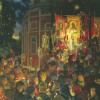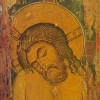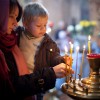 Is there such a thing as an attachment to a pastor? Is it admissible, does it not get in our way on the path to salvation? An event from the life of St John Chrysostom provides an answer to these questions. As is well-known, the saintly bishop used to suffer greatly from his ailments and once, in his weakness, he entrusted two bishops to give the sermon. But the people were so annoyed that St John was forced to abandon his state of reclusion and go out to them. He preached a sermon to the people in which he addressed them in the fondest, most tender and heartfelt terms.
Is there such a thing as an attachment to a pastor? Is it admissible, does it not get in our way on the path to salvation? An event from the life of St John Chrysostom provides an answer to these questions. As is well-known, the saintly bishop used to suffer greatly from his ailments and once, in his weakness, he entrusted two bishops to give the sermon. But the people were so annoyed that St John was forced to abandon his state of reclusion and go out to them. He preached a sermon to the people in which he addressed them in the fondest, most tender and heartfelt terms.
Here we see an example; it means that there is such a thing as an attachment of the flock to a pastor. Without this attachment there will be no love and without love there will be no trust in the pastor.
Thinking about the attachment of the pastor to his flock, let us first notice their relations. Firstly, love must exist between the pastor and the flock
The pastor is responsible for his flock. My soul always aches for you. Above all, when one of you starts to be inconstant and stops going to church. Yet prayer is vital and everybody must go to church in order to pray together.
On feast days we must go to church and on other days only when this does not upset the others at home, for love at home is higher than prayer – love is the foundation of our salvation. The supreme thing in life is purity. Lots of talking goes on around us nowadays and when one of the parishioners has not attended church for some time, you begin to wonder if some misfortune has not occurred, if someone has not led their soul astray.
As we move towards Christ, we must preserve purity not only in our feelings, but also in our thoughts and conversations.
Finally, an absence of reverence gets noticed and gossip starts. Each pastor has his admirers, male and female, but if something happens, talk and gossip start. Thus, we must show constancy in our salvation and not break the laws of love in our mutual relations with those near and dear to us, condemning no-one.
We must pay the least amount of attention to the externals of the service: to good choirs and other ‘effects’ and we must look to what warms our hearts.
Here is what I would ask you to think about and take care of for the good of your souls.
Translated from the Russian
The future Bishop Benjamin was born Victor Milov into the family of a priest on July 8, 1887, in Orenburg. He graduated from the Vyatka Seminary and later the Moscow Theological Academy. He was tonsured a monk in 1918, and soon elevated to the rank of archimandrite. He was then appointed superior of the Protection Monastery in Moscow. From 1946 he was a member of the monastic brotherhood at the Holy Trinity-St Sergius Lavra and taught at the Moscow Theological Seminary and Academy, specializing in patrology and pastoral theology. In 1948 he defended his master’s thesis entitled “The Love of God According to the Teaching of the Bible and the Orthodox Church,” and was awarded the title of professor and appointed Dean of Students of the Moscow Theological Academy. In 1954 he was appointed rector of the St Elias Church in Serpukhov. On February 4, 1955, he was consecrated Bishop of Saratov and Balashov in the Annunciation Cathedral by Patriarch Alexy I and other hierarchs. He reposed on August 2, 1955.



















